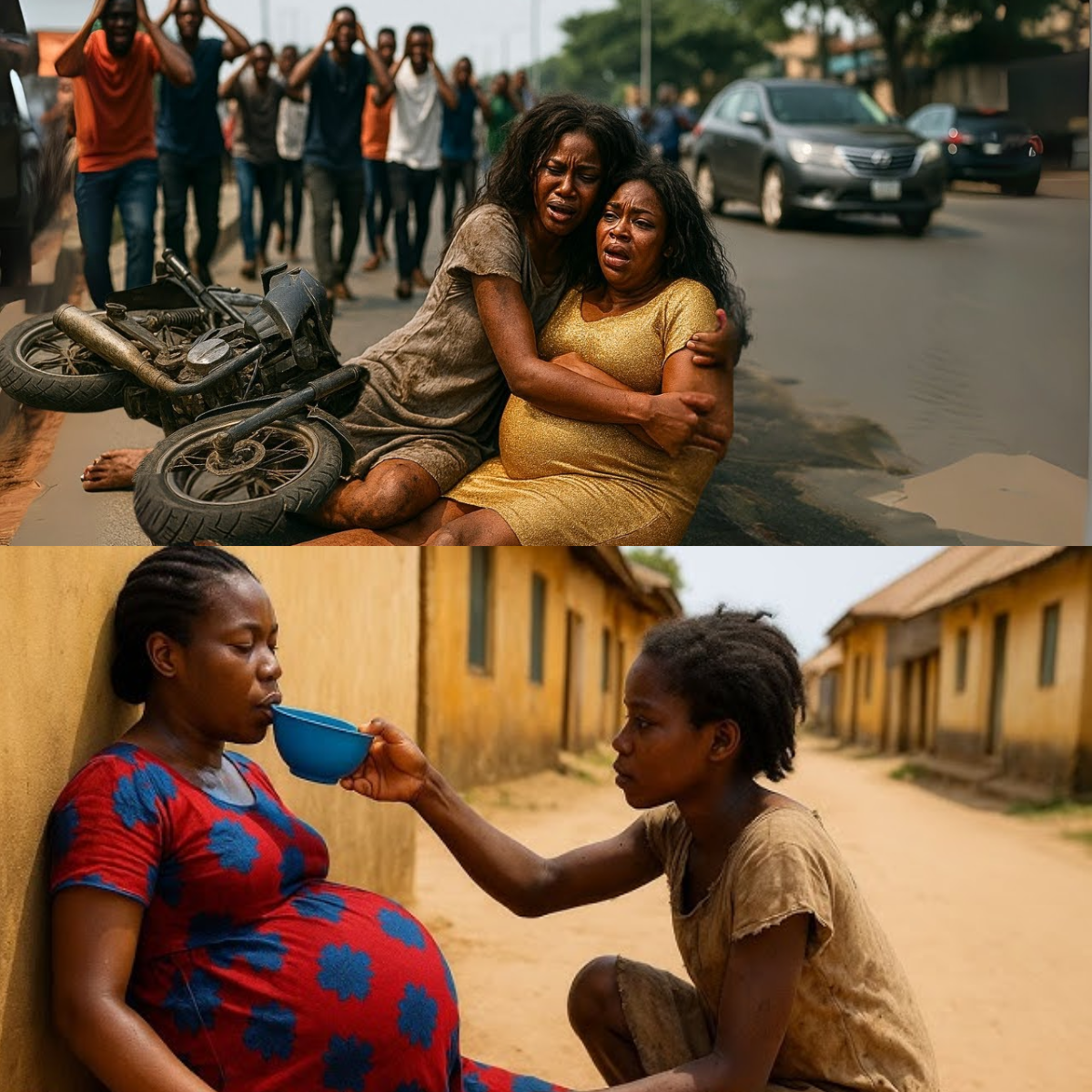Homeless Orphan Lost Her Legs Trying to Save a Pregnant Woman — Unaware She’s a Billionaire
A Child of the Streets

In the bustling heart of Lagos, under bridges where the city’s lights rarely reached, lived Amara, a 14-year-old orphan. Life had been merciless. Her parents died in a bus accident when she was six, and distant relatives cast her out soon after. Since then, the streets became her only home.
Every day, Amara begged for scraps at the marketplace, chasing the smell of fried plantain, sharing gutters with other forgotten children. But even in her suffering, Amara never grew bitter. She carried an unusual gift: compassion. She was known to give her last piece of bread to a stray dog or comfort a crying child with stories her mother once told her.
The traders often shook their heads. “This girl,” they whispered, “she has nothing, yet she gives like a queen.”
The Day Fate Tested Her

It was a humid afternoon when the market square throbbed with life—hawkers calling, drums beating from a nearby festival, and cars honking impatiently through the crowd. Amara sat by the roadside, clutching an empty tin, her stomach rumbling.
Suddenly, chaos erupted. A heavily pregnant woman was crossing the busy street when a lorry’s brakes failed, screeching down the road like a wounded beast. People screamed. Some fled. The woman froze in terror, clutching her belly.
Amara didn’t think. Her legs moved before her mind did. She darted into the road, shouting, “Mama, move!” She pushed the woman with all her strength. The lorry swerved violently—but not enough.
The pregnant woman collapsed safely onto the sidewalk. Amara, however, was caught by the edge of the vehicle. The sound was like thunder. Then silence, broken only by the girl’s scream.
The Price of Compassion
Crowds gathered. The driver jumped out, horrified. Blood stained the asphalt. Amara lay crumpled, her small frame trembling. Both her legs were crushed beyond saving.
As she slipped in and out of consciousness, the pregnant woman knelt beside her, weeping. “Stay with me, my child. Stay with me.”
At the hospital, doctors fought to save Amara’s life. Hours later, they emerged grim-faced: to keep her alive, they had amputated both legs.
For most, this would have been the end of hope. A homeless, legless orphan in a world already merciless to the poor. But fate was not finished with Amara.
The Woman She Saved
The woman Amara had saved was no ordinary passerby. Her name was Ngozi Okafor, one of Nigeria’s wealthiest business magnates, a billionaire whose empire stretched from oil to technology. Known for her philanthropy but shrouded in mystery, Ngozi lived in seclusion, rarely seen outside her armored cars and guarded mansions.
Yet here she was, weeping at the bedside of a legless street child.
When Amara awoke, her first words were not about herself. “Is your baby safe?” she whispered.
Ngozi’s heart broke. She nodded, clutching the girl’s hand. In that moment, the billionaire made a silent vow: this child who had given everything would not suffer another day.
A New Chapter Begins
The story spread like wildfire. Newspapers carried headlines: “Street Orphan Saves Billionaire Heiress, Loses Legs.” Social media erupted with Amara’s photo—frail, smiling weakly from her hospital bed. Hashtags trended across Africa and beyond: #HeroAmara and #AngelOfTheStreets.
Donations poured in. Strangers offered wheelchairs, prosthetics, even adoption. But Ngozi Okafor had already decided: Amara was now her daughter.
Within weeks, Amara was moved into the billionaire’s mansion, her tin can replaced with tutors, doctors, and toys. For the first time in her life, she slept on a soft bed, ate until her stomach was full, and wore clothes that weren’t torn.
But wealth wasn’t the only gift. Ngozi gave Amara something far rarer: belonging.
From Orphan to Heiress
Under Ngozi’s care, Amara blossomed. She learned English and French, studied mathematics and literature, and even began painting—her canvases often filled with the markets and streets she once called home. Prosthetic specialists from Europe fitted her with advanced limbs, but Amara continued to use a wheelchair most days.
“I don’t hide my scars,” she said. “They are proof that love is worth pain.”
As years passed, Amara grew into a poised young woman. Ngozi formally adopted her, declaring in a televised ceremony: “This child is my greatest fortune. She gave me my life, and now I give her mine.”
The public was stunned. Overnight, the girl once mocked as a “beggar” became one of the richest heiresses in Africa.
But Shadows Remain
Despite her new life, Amara never forgot the streets. She returned often, disguised in plain clothes, handing out food to children who reminded her of herself. She built a foundation—the Amara Trust—dedicated to homeless orphans, investing millions into shelters, schools, and clinics.
Yet whispers followed her. Some questioned why the bus had lost its brakes that day. Others suggested the accident wasn’t an accident at all but a failed attempt on Ngozi’s life—one that Amara had unknowingly foiled.
Investigators hinted at sabotage, rival business interests, enemies hidden behind polished smiles. Was Amara’s sacrifice simply fate, or had she saved the billionaire from something darker?
Ngozi refused to comment, shielding Amara from the speculation. But those close to the family admitted the billionaire never left her mansion without doubled security again.